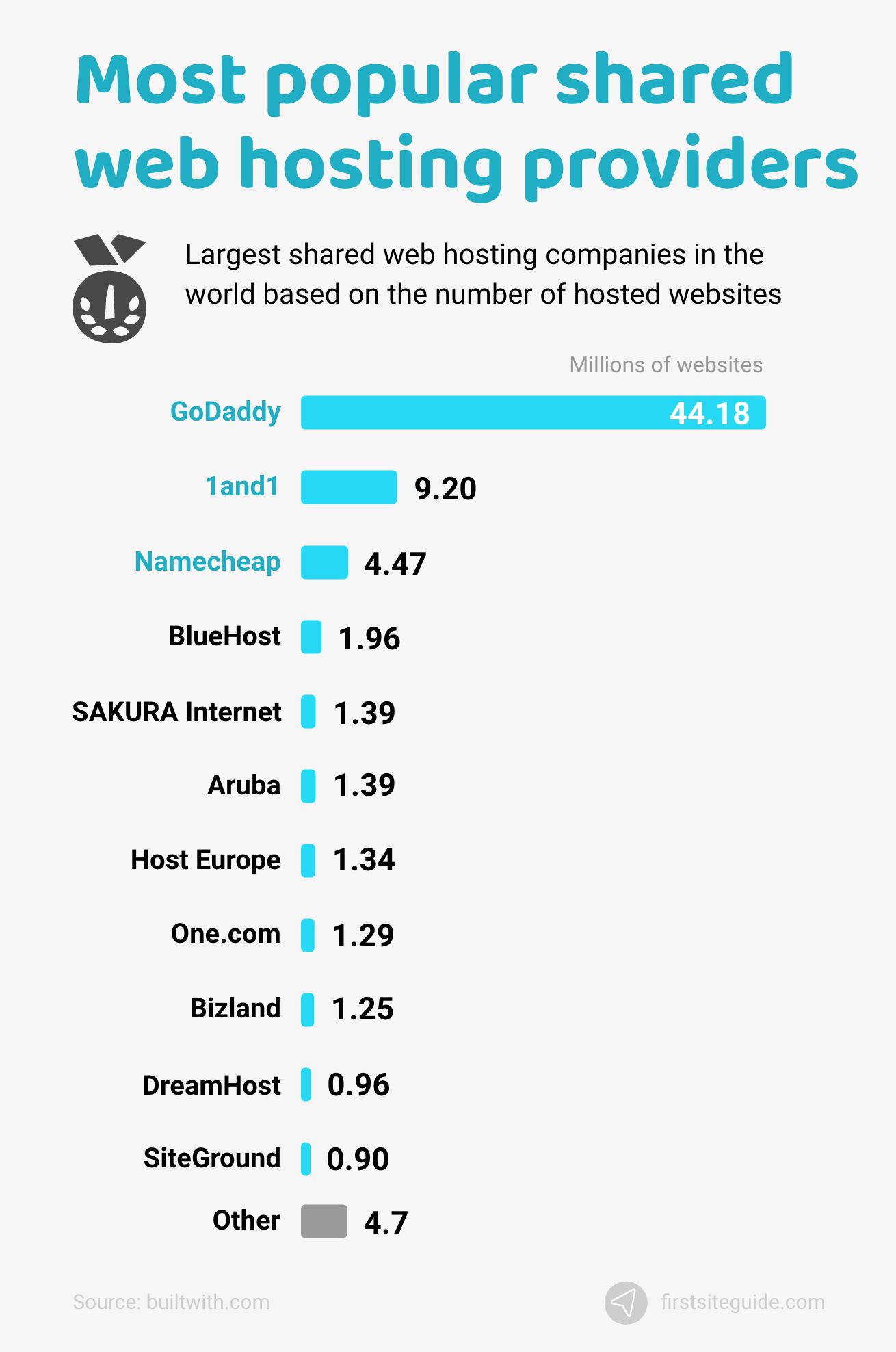Web hosting is essential for any website’s success. But, do you know why?
Understanding web hosting statistics can help you see its true impact. Web hosting statistics provide valuable insights into the digital world. From the number of websites to server uptimes, these stats reveal important trends. They help businesses make informed decisions about their online presence.
For instance, knowing the market share of top hosting providers can guide your choice. Additionally, statistics about downtime can highlight reliability issues. By examining these numbers, you can optimize your website’s performance and ensure better user experiences. Dive into these stats to understand how web hosting affects your website’s success and what you can do to improve it.
Introduction To Web Hosting
Welcome to the world of web hosting. This guide explores the basics. We’ll uncover what web hosting is and its importance for your website.
What Is Web Hosting?
Web hosting is a service. It allows you to put your website on the internet. Think of it as renting space on a server. This server stores your website’s files. It makes them accessible to users online. Without web hosting, your site cannot be viewed by others.
Importance Of Web Hosting
Web hosting is crucial. It impacts your website’s performance. A good web hosting service ensures fast load times. This keeps your visitors happy. It also affects your site’s security. Reliable hosting protects your data. It keeps hackers away.
Web hosting also influences your site’s uptime. Uptime is the time your site is live and accessible. High uptime means fewer downtimes. This keeps your audience engaged. Good hosting supports better SEO. Search engines prefer fast and reliable sites. They rank them higher in search results.
Global Market Trends
The web hosting industry is evolving rapidly. Global market trends show significant growth, driven by the increasing number of websites and online businesses. Let’s dive into some key insights about this dynamic market.
Market Growth
The global web hosting market is expanding. By 2027, experts project it to reach $171.4 billion. This growth is due to the rising demand for reliable hosting services. More businesses are moving online, boosting the need for web hosting. Small businesses, in particular, are driving this trend.
Cloud hosting is a major contributor to market growth. Its flexibility and scalability attract many users. Shared hosting remains popular among small businesses and personal websites. The e-commerce boom also fuels market expansion. Online stores need robust hosting solutions to handle traffic and transactions.
Regional Insights
North America leads the web hosting market. The region has many established hosting providers. The presence of tech giants like Amazon and Google further strengthens its position. Europe follows closely, with a growing number of hosting companies.
Asia-Pacific shows impressive growth. Countries like China and India are key players. The increasing number of internet users in these regions drives demand. Latin America and Africa are emerging markets. These regions see rising internet penetration and online business activities.
Popular Hosting Providers
Choosing the right web hosting provider is crucial for your online success. There are many hosting companies available, but some stand out due to their reliable services and strong market presence. Let’s explore some of the most popular hosting providers and their market share distribution.
Top Companies
Several companies dominate the web hosting industry. These providers offer a range of hosting services to meet different needs. Here are some of the top companies:
- Bluehost – Known for its excellent customer support and affordable plans.
- HostGator – Popular for its flexible hosting packages and uptime guarantee.
- SiteGround – Renowned for its fast loading times and top-notch security features.
- GoDaddy – Offers a wide array of hosting services and domain registration.
- InMotion Hosting – Praised for its reliable performance and customer-centric approach.
Market Share Distribution
The market share of web hosting providers indicates their popularity and trust among users. Here is a breakdown of the market share distribution among the leading hosting companies:
| Company | Market Share (%) |
|---|---|
| Bluehost | 18% |
| HostGator | 16% |
| SiteGround | 12% |
| GoDaddy | 30% |
| InMotion Hosting | 8% |
This table shows the leading companies in the web hosting market. GoDaddy holds the largest share, followed by Bluehost and HostGator. Understanding this distribution helps in making informed decisions.

Credit: financesonline.com
Types Of Web Hosting
Web hosting is essential for any website to go live on the internet. Different types of web hosting cater to various needs and budgets. Let’s explore the main types of web hosting available today.
Shared Hosting
Shared hosting is the most popular and affordable type of hosting. In shared hosting, multiple websites share a single server. This reduces costs but may affect performance.
- Cost-effective: Ideal for small websites and beginners.
- Easy to manage: Hosting provider handles server maintenance.
- Limited resources: Shared resources can lead to slower speeds.
Vps Hosting
VPS (Virtual Private Server) hosting offers more control and resources than shared hosting. It uses virtualization to divide a single physical server into multiple virtual servers.
- Increased control: Users get root access to their virtual server.
- Better performance: More resources dedicated to each user.
- Scalability: Easy to upgrade resources as your site grows.
Dedicated Hosting
Dedicated hosting provides an entire server dedicated to one website. This option is best for large websites with high traffic.
- Full control: Users have complete control over the server.
- High performance: No sharing of resources with other websites.
- Higher cost: More expensive than shared or VPS hosting.
Cloud Hosting
Cloud hosting uses a network of servers to host websites. This offers flexibility and reliability.
- Scalable resources: Easily adjust resources based on needs.
- High uptime: Redundant servers ensure minimal downtime.
- Cost varies: Pay for what you use, can be cost-effective.
| Hosting Type | Cost | Performance | Scalability |
|---|---|---|---|
| Shared Hosting | Low | Low | Low |
| VPS Hosting | Medium | Medium | Medium |
| Dedicated Hosting | High | High | Low |
| Cloud Hosting | Varies | High | High |
User Demographics
Understanding user demographics in web hosting helps tailor services and marketing strategies. It also provides insights into the needs and preferences of different user groups. Knowing who uses web hosting is crucial for making informed business decisions.
Business Vs. Personal Use
Web hosting serves both business and personal users. Businesses often seek hosting for e-commerce sites and company pages. They require reliable and secure services. Personal users might want to create blogs or hobby websites. They usually look for affordable and easy-to-use options. The needs and expectations differ significantly between these groups.
Industry Usage
Various industries utilize web hosting services. Tech companies often need advanced features and high bandwidth. Retail businesses focus on e-commerce capabilities and payment processing. Educational institutions require large storage and user management tools. Media and entertainment sectors need robust multimedia support. Each industry has unique hosting demands.

Credit: www.enterpriseappstoday.com
Performance Metrics
Performance metrics are crucial in evaluating web hosting services. These metrics provide insights into how efficiently your website will run. Key performance indicators include uptime, speed, and reliability. Each of these elements contributes to the overall user experience and search engine rankings.
Uptime Statistics
Uptime is a measure of the time a server stays operational. A higher uptime percentage means better service quality. Most web hosting services guarantee 99.9% uptime.
| Web Hosting Provider | Uptime Percentage |
|---|---|
| HostGator | 99.98% |
| Bluehost | 99.99% |
| SiteGround | 99.97% |
Frequent downtime can affect your site’s performance and rankings. Always choose a host with high uptime.
Speed And Reliability
Speed is essential for user satisfaction and SEO. Slow loading times can lead to higher bounce rates. Reliable hosting services provide fast load times. Here are a few factors that influence speed:
- Server location
- Bandwidth
- Content Delivery Network (CDN)
Consider these factors when choosing a web host:
- Server Response Time
- Load Time
- Downtime Frequency
Reliable services maintain consistent speed. They also offer robust support to resolve issues quickly. Speed and reliability significantly impact user experience and SEO rankings.
Cost Analysis
Understanding the cost of web hosting is crucial. It helps businesses budget effectively. This section explores the cost aspects. Learn about pricing trends and the balance between cost and performance.
Pricing Trends
Web hosting prices have varied over the years. Shared hosting remains affordable for many. These plans can cost as low as $3 per month. VPS hosting is pricier, ranging from $20 to $100 monthly. Dedicated servers are the most expensive option. They can cost over $100 per month. Cloud hosting offers scalable pricing. It starts at around $10 per month. Prices can increase with more resources.
Cost Vs. Performance
Choosing the right hosting means balancing cost and performance. Shared hosting is cheap but may have slow speeds. It is ideal for small websites. VPS hosting offers better performance at a higher cost. It suits medium-sized sites. Dedicated servers provide top performance. They are best for large websites. Cloud hosting is flexible and scalable. It can handle traffic spikes well. Consider your needs before choosing.

Credit: firstsiteguide.com
Future Predictions
The web hosting industry is constantly evolving. Future predictions indicate significant changes in the coming years. This section explores these predictions. We will look at technological advancements and the market forecast. These insights will help you understand the future of web hosting.
Technological Advancements
Artificial Intelligence (AI) will play a big role in web hosting. AI can optimize server performance. It can also provide better security against cyber threats.
Cloud hosting is another area to watch. It offers scalability and flexibility. Businesses can scale resources based on demand. This makes it cost-effective.
Green hosting is gaining popularity. Companies are focusing on energy-efficient servers. This helps reduce their carbon footprint.
Here is a table summarizing these advancements:
| Advancement | Benefits |
|---|---|
| Artificial Intelligence (AI) | Optimizes performance, enhances security |
| Cloud Hosting | Scalability, cost-effective |
| Green Hosting | Energy-efficient, eco-friendly |
Market Forecast
The web hosting market is expected to grow significantly. Research suggests that the market will reach $216 billion by 2025. This growth is driven by the increase in internet users. More businesses are going online. E-commerce is booming.
Key regions such as North America and Asia-Pacific will lead this growth. These regions have a high number of tech-savvy users. They also have strong digital infrastructure.
Here are some key points to consider:
- More businesses will adopt cloud hosting.
- AI integration will improve service quality.
- Green hosting will become a standard.
Frequently Asked Questions
What Is Web Hosting?
Web hosting is a service that allows individuals and organizations to make their website accessible via the Internet. Hosting providers offer space on their servers for clients’ websites.
How Does Web Hosting Work?
Web hosting works by storing website files on servers connected to the Internet. When users access your website, the server delivers the files to their browser.
Why Is Web Hosting Important?
Web hosting is important because it ensures your website is accessible online. Reliable hosting improves website performance, security, and user experience.
What Are The Types Of Web Hosting?
The main types of web hosting are shared, VPS, dedicated, and cloud hosting. Each type offers different resources and levels of control.
Conclusion
Web hosting is crucial for online success. The statistics show its importance. Choose a reliable host to enhance your website’s performance. Keep an eye on trends and update your hosting plan accordingly. A good web host ensures faster load times and better security.
Investing in the right hosting can lead to more visitors. Stay informed and make smart decisions for your web presence. Your website’s success depends on it.










